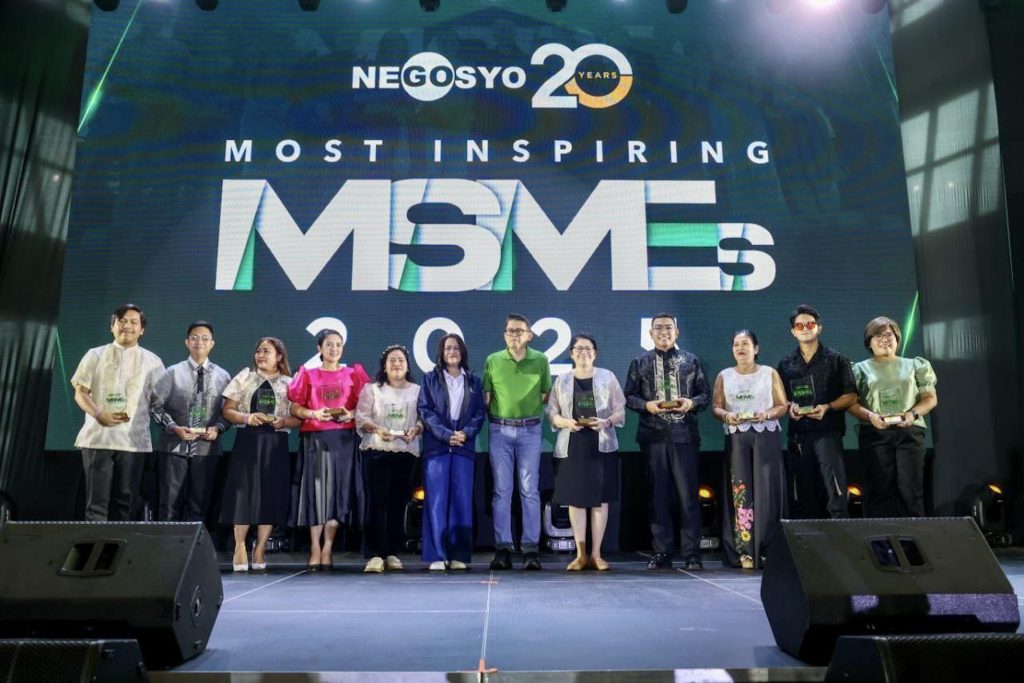
MSME Summit 2025
July 19, 2025
DTI Trade Fair Showcases Potential of Filipino MSMEs
July 26, 2025
Lessons from the Year’s Inspiring Filipino MSMEs
Every year, Go Negosyo names the year’s Most Inspiring MSMEs. They are chosen from hundreds across the Philippines, not only for the success of their enterprises, but also for their stories and their contributions to their communities. They have to be positive, passionate and inspiring, and the business must be backed by an innovative and sustainable business model.
Too often, enterprises are judged by their profits alone, or how quickly they went from zero to millions. As many of us in business know, this can all be too easy to gain, and even easier to lose. And then there’s the temptation to prioritize short-term gains at the expense of sustainability and the community. This is why Go Negosyo’s Most Inspiring Entrepreneurs must not only have excelled in their enterprises, but they must also have made significant contributions to their communities. Their stories have to reflect that entrepreneurship should be a force for good. I think this year’s awardees are exactly that.
Take Astley Jude Anaviso, for instance. By founding MonsterPot Plant Nursery, he established the country’s first DENR-accredited carnivorous plant nursery and a sanctuary for endangered plants, demonstrating how entrepreneurship can intertwine with environmental conservation.
Bhai Nhuraisah Deplomo’s story is one that I hope will be replicated in the years to come. She founded Erovoutika, a multi-awarded Filipino-owned automation and robotics company producing nearly a thousand robotic kits a year. With many Filipinos displaying proficiency in science and technology, I hope many more will be inspired by how she complemented her technical skills with an entrepreneurial drive.
Luzviminda Yerro’s insistence on making quality products in small batches and prioritizing healthy, whole-food ingredients earned her loyal customers. She founded Delishoso and put her training as a chef to creating bottled Filipino condiments and gourmet spreads that are convenient yet still artisanal. She proved that an entrepreneur has to be, first and foremost, a believer in her product. There is no room for pessimism in entrepreneurship.
The personal motivations behind these ventures are undeniably powerful. After the tragic loss of her twin sons to a congenital condition, Jacie Joy Real founded Real Playtown to create a safe haven for families to forge lasting memories. This speaks to the profound impact personal experiences can have on entrepreneurial vision.
Like Jacie, Cristina Monroy was also motivated by personal challenges. She found herself having to support both her young child and her widowed mother while working as a freelance photographer. She decided that entrepreneurship might be a better way to provide financial support and have a structured work schedule over which she can have some amount of control. This led her to open a unique premium nail spa that now boasts several branches in the Visayas and Mindanao.
Resilience, too, is a hallmark of these entrepreneurs. Each faced their own set of challenges – be it personal hardships or market difficulties – but they transformed these obstacles into opportunities. John Paul Naoe turned a family health concern into a thriving bakeshop when he tried to find a way for his diabetic father to still enjoy treats. His focus on sugarless and low-sugar desserts spurred him to find solutions for this specific market, and along the way discovered he had a knack for business.
Innovation is another recurring theme among these awardees. Angelo Jade Rivera broke new ground by introducing unique shawarma flavors and pioneering a franchise model in the Philippines. This spirit of innovation is echoed by Neero Lumanglas, whose roadside venture, La Aroma Café, emerged during the pandemic, proving that even in challenging times, creativity can lead to success.
I can’t emphasize enough the importance of having a mentor. Our two awardees, Angelo and Neero, for example, had their own families as mentors in entrepreneurship. As a child, Angelo would accompany his grandmother as she sold tilapia in the market. Neero, on the other hand, grew up in a family of small business owners.
Another common thread running through these winners is the institutional assistance they received from government and private sector. Most availed of free training from the Department of Trade and Industry (through the program we share with them, the Kapatid Mentor ME) or their local government unit. Some turned to the Department of Science and Technology, the Department of Environment and Natural Resources or the Department of Tourism for technical assistance, assistance in accreditation or grants, while some got assistance from the private sector or business organizations for help with markets or money (capital). Their success was not achieved in a bubble. Where there was a gap in their resources or skills, government or private sector stepped in to fill it.
These inspiring stories highlight essential lessons for aspiring entrepreneurs and us in their ecosystem as well. We must encourage their passion for entrepreneurship and clear the way for their success and, by extension, the country’s prosperity.
Originally Published in Philippine Star


2/F RFM Corporate Center, Pioneer cor. Sheridan Sts. Mandaluyong City, Metro Manila, Philippines

